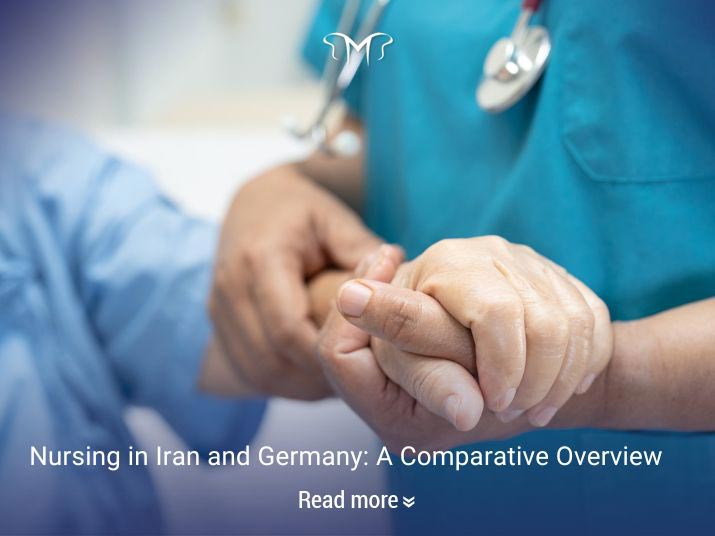
Nursing in Iran and Germany: A Comparative Overview
The Role of Nursing in Iran and Germany
In both Iran and Germany, nurses play a critical role in the healthcare system, bearing significant responsibilities. However, their duties and scope of practice are shaped by each country's cultural, economic, and structural factors.
Nursing Roles in Germany
Nursing responsibilities in Germany are broader and more diverse than in Iran. Nurses work in hospitals, senior care centers, and provide home nursing services. Their duties include monitoring patient conditions, assisting with daily activities, administering injections, and managing medication schedules. They also act as a link between doctors and patients' families. Germany’s nursing education system is designed to help nurses enhance their skills through specialized courses, earning internationally recognized qualifications.
Nursing Roles in Iran
While nurses in Iran perform similar tasks, resource shortages and a lack of personnel can make their work more challenging. Their duties include patient care, assisting doctors during examinations, and monitoring patient conditions. However, long working hours and high workloads often impact the quality of care. Like their counterparts in Germany, Iranian nurses provide vital support to patients, but economic and social challenges heavily influence their roles.

Differences in Nursing Education
The educational systems for nursing in Iran and Germany differ significantly in terms of admissions, costs, and structure.
Nursing Education in Iran
To pursue nursing in Iran, students must hold a high school diploma in sciences and pass a national university entrance exam. Nursing education spans four years, combining theoretical and practical courses. Students complete internships to apply their knowledge in hospitals and prepare for their careers. Tuition fees vary depending on the university and program.
Nursing Education in Germany
Similarly, nursing education in Germany requires a high school diploma, with international students needing a B2 level in German. Some universities also require entrance exams. Programs last three to four years and cover various nursing fields, including pediatric and geriatric care. Unlike Iran, many German universities offer free or low-cost education. However, international students must also account for Germany’s higher cost of living.

Work Environment Differences
The nursing work environments in Iran and Germany reflect disparities in healthcare systems, economic conditions, and workplace cultures.
Work Environment in Iran
Iran’s healthcare system is largely government-controlled, with most hospitals under the Ministry of Health. Nurses often face limited resources, outdated equipment, and long, demanding hours. Theoretical training dominates nursing education, leaving fewer opportunities for practical learning.
Work Environment in Germany
Germany’s healthcare system is a mix of public and private sectors, offering nurses a variety of job opportunities in hospitals, clinics, and elderly care centers. German nurses benefit from access to advanced resources and flexible working hours. Workplace culture emphasizes teamwork, mutual respect, and adherence to high ethical standards, creating a more supportive environment.
Salary and Benefits
Nurses’ salaries and benefits vary greatly between Iran and Germany due to differences in economic conditions and job demand.
Nurses’ Income in Iran
Iranian nurses earn an average monthly salary of 13 to 25 million tomans, influenced by factors like workplace and experience. They receive benefits such as housing allowances, bonuses, health insurance, and shift pay.
Nurses’ Income in Germany
German nurses earn an average annual salary of €40,000, depending on factors like experience and workplace. In addition to salaries, they enjoy health insurance, paid leave, free training opportunities, and other professional benefits.

Cultural and Responsibility Differences
In Iran, nursing focuses more on specialized medical care, with primary patient care often delegated to assistants. The work culture is generally warm and supportive. In contrast, German nurses handle a broader range of responsibilities, from initial care to patient education and follow-ups. The workplace culture is less personal but highly professional, emphasizing efficiency and collaboration.
Reasons for Iranian Nurses Migrating to Germany
Germany has become a popular destination for Iranian nurses due to its higher salaries, better quality of life, flexible working conditions, and greater professional respect. Factors encouraging migration include:
- Increased pay and benefits.
- Improved job security.
- Reduced workload and flexible schedules.
- Enhanced social status.
Future Job Prospects
In Iran
Despite a large number of nursing graduates, job opportunities in Iran are limited and competitive due to government hiring filters. The lack of advanced training and internship opportunities further complicates employment prospects.
In Germany
Germany faces a nursing shortage due to its aging population, creating high demand for foreign nurses. The government facilitates the immigration process for healthcare professionals, making it an attractive option for those seeking a stable career abroad.

Conclusion
Germany offers a promising future for nurses with attractive working conditions, higher pay, and strong job security. In contrast, nursing in Iran faces challenges such as resource shortages and demanding workloads, driving many nurses to seek better opportunities abroad. If you’re considering a nursing career in Germany, we at Monarch Immigration Services can guide you through the process. Contact us to start your journey toward a secure and prosperous future.


